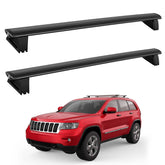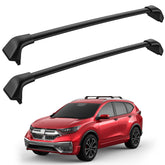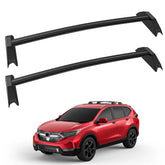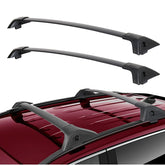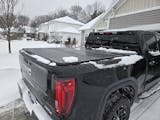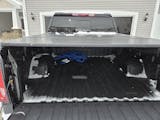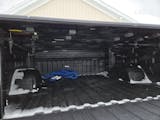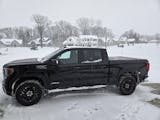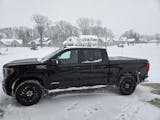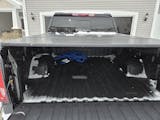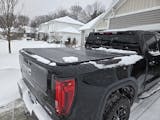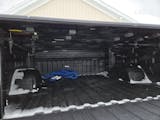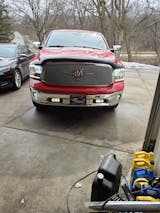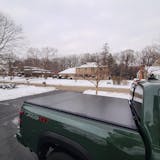Can roof racks go through a car wash?
It's the question every road-going adventurer worries about: Can that trusty roof rack, standing tall and carrying memories of rugged terrain and faraway landscapes, survive the onslaught of an automatic car wash? Imagine the soapy suds swirling, the fierce brushes spinning, and the powerful jets whirring and pounding every surface of your vehicle. In that tense moment, your roof rack will be subjected to forces akin to a miniature storm. But will it emerge unscathed, or will it risk losing the integrity of its attachment? In this guide, we take a deep dive into everything from car wash types to potential roof rack damage so you can make an informed decision.

Types of car washes
From fully automatic machines that remove dirt in seconds to gentle manual car washes, each type offers a different experience. Each requires careful consideration if your vehicle has a roof rack or sensitive accessories. Here are the different types of car wash methods, each with its features, charms, and potential pitfalls.
Brush car washes
Brush car washes are the classic automated experience. These washes use a spinning brush made of soft cloth or foam to scrape away dust, dirt, and grime for a quick and thorough clean. While effective, the friction and physical contact can cause some issues for your roof rack. When your vehicle has a lot of debris or the brushes are not in good condition, the brushes can get snagged or cause minor scratches. Brush car washes aren't always the best option. If you must use a brush car wash, check your roof rack regularly afterward to catch any loose parts before they become bigger problems down the road.
Touchless car washes
As the name implies, this type of car wash does not physically touch your car. Touchless car washes offer a unique hands-free method of cleaning your vehicle using powerful jets and specialized detergents without the risk of abrasive contact. This type of wash is safer for vehicles with roof racks. The beauty of touchless car washes is their gentleness, and no brushes means no risk of scratches or abrasions.
While touchless car washes eliminate the risk of physical damage, they also come with their own set of challenges. High-pressure water jets can get into small gaps around roof racks, loosening bolts or making attachments unstable. For racks with attached accessories (bike racks, cargo boxes, or kayak racks), this pressure can be enough to dislocate items.
Additionally, because touchless car washes avoid direct contact, it is sometimes difficult to remove stubborn dirt and not achieve the deep cleaning that a brush can.

DIY hand washes
DIY hand washing is the perfect blend of control, care, and customization for car owners who like to get their hands dirty. It's the safest and most thorough option. Hand washing allows you to pay attention to every part of your car, gently handling delicate brackets, bolts, and fittings. Unlike high-pressure jets or fast-spinning brushes, DIY car washing also allows you to remove any roof-mounted equipment as needed, making it easier to individually access and thoroughly clean your roof and roof rack.
The downside? It's time-consuming and requires some effort. But DIY washing not only saves money, it also minimizes the wear and tear that comes with using more stringent cleaning methods. With a little care and patience, DIY washing will ensure that your car and roof rack remain spotless, safe, and ready for any adventure.
Self-serve car washes
Self-service car washes offer a unique middle ground between DIY and automated options, giving drivers the freedom to wash their cars with a high-pressure hose and brush. Enabling you to tailor the wash service to the specific needs of your vehicle, it’s perfect for those with roof racks, reducing the risk of roof rack damage.
Here, you can carefully adjust the water pressure to avoid loosening bolts or damaging fittings. With a steady hand, you can divert water pressure away from sensitive areas and focus only on the dirt that needs to be removed. Foam brushes are typically softer than automated brushes, allowing you to gently scrub away dirt and debris without risking scratches or snags on the rack or body of the car. It’s ideal for those who like to take care of their vehicle themselves but want to avoid the hassle of hand-washing at home.
How can a roof rack get damaged by a car wash?
When it comes to automatic car washes, roof racks often face hidden dangers that many drivers overlook. While car washes can handle most vehicles, powerful jets, spinning brushes, and tight spaces present unique dangers to roof racks and roof-mounted equipment. Here's how car washes can pose potential hazards to your rack.
Snagging and scraping from brushes
Brush car washes (with large spinning cloths or foam bristles) are effective for cleaning, but they are risky for roof racks. The brushes can get caught on the edges and snag on the rack or anything mounted on it. This can cause scratches, dents, or even cause the rack to move out of place. The risk of snagging and dragging is higher for racks with protruding attachments, such as bike racks, cargo boxes, or kayak racks.
High-pressure water damage
Touchless car washes rely on intense, high-pressure water jets. While these jets avoid direct contact, if the water pressure is too high or the angle is poor, it can weaken fasteners, dislodge small parts, or vigorously shake the rack. Over time, repeated exposure to high-pressure water can even cause bolts to loosen, making the roof rack less secure.

Chemical exposure
Some automatic washers use strong detergents to remove dirt, but these chemicals can be harsh on roof rack materials. If left to dry on metal or plastic parts, they can corrode the parts over time. Prolonged contact can cause gradual wear, and discoloration, or shorten the life of rubber seals or plastic fittings.
Vibration and shaking
Inside an automatic car wash, the entire vehicle experiences vibration and shaking. This constant motion can strain the bolts, fasteners, and brackets that hold the roof rack in place, making them susceptible to loosening. A roof rack that is not securely fastened can move, causing scratches or falling off.
Is it OK to go through a car wash with a roof rack?
Can you take your car to a car wash with a roof rack? The answer is nuanced. Most roof racks are designed to withstand typical road conditions and even inclement weather. However, automated car washes present a unique set of challenges that can put unexpected stress on your roof rack and the items it carries.
Loose bolts, improper alignment, or dangling items on your roof rack increase the risk of damage during the wash. If you're carrying bulky or fragile items like kayaks, bikes, or cargo boxes, it's safer to remove them. Even if these items are securely fastened, the strength of the car wash brushes and their repetitive motion can damage or dislodge them.
Even if your roof rack is intact, repeated car washes can gradually wear down its surface, loosening screws or corroding the surface over time. This wear and tear not only affects the aesthetics but also the structural integrity of the rack, shortening its lifespan.

In summary, while you can take your roof rack to a car wash, it's advisable to proceed with caution. Opt for a touchless car wash, securely fasten all components, and consider removing valuable or fragile items. By taking a few precautions, you can help prevent unnecessary wear and tear and ensure your roof rack stays in tip-top shape for the long haul.
Featured Products
- $83.99
- $83.99
- Unit price
- / per
- $85.99
$138.90- $85.99
- Unit price
- / per
- $69.99
- $69.99
- Unit price
- / per
- $98.99
- $98.99
- Unit price
- / per
